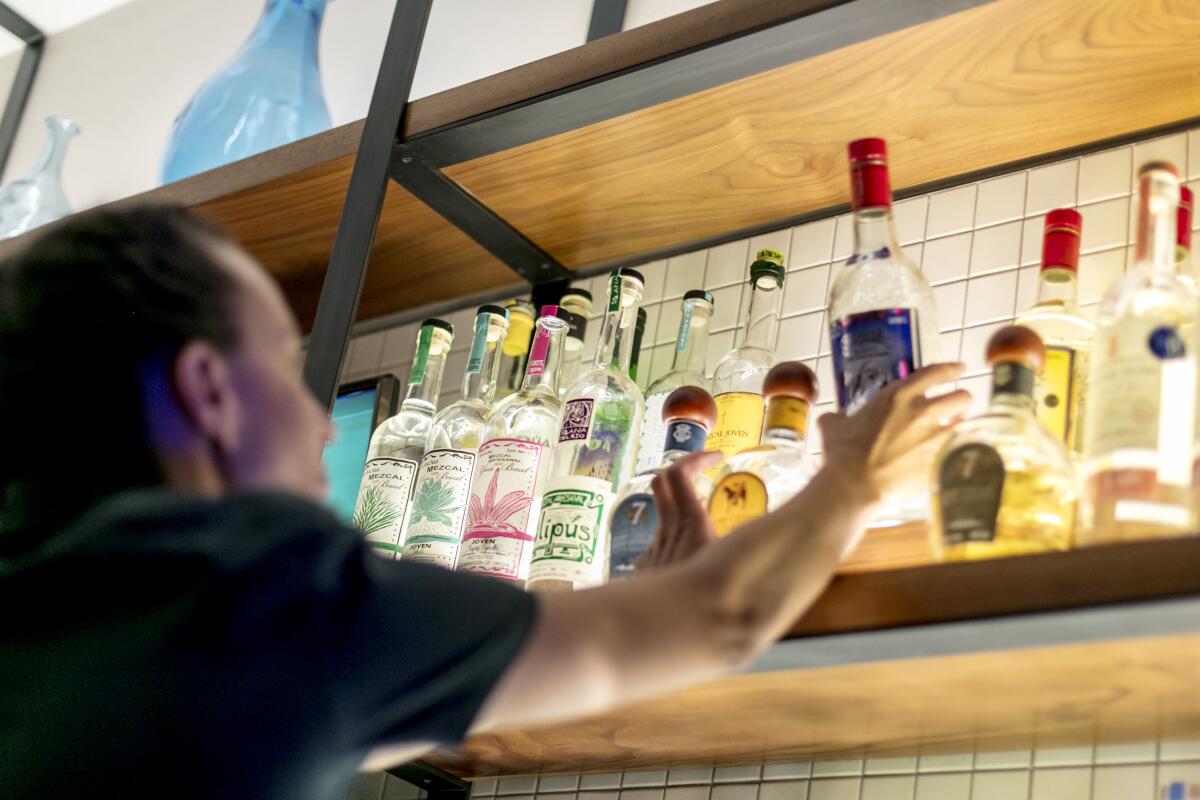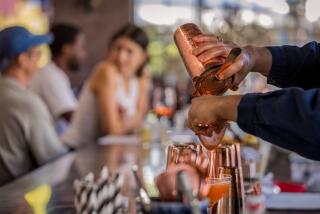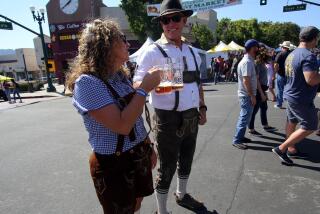‘They don’t even know this law exists’: A new alcohol rule hangs over state bars, restaurants

By the end of summer, every bar and restaurant employee who serves alcohol in California must obtain a new certification.
So far, just 33,000 people have become certified, a fraction of the hundreds of thousands of workers employed by not only bars and restaurants but also wineries, breweries, distilleries, brewpubs, event centers and stadiums — essentially any place of business where you can drink. There’s worry from some in the industry about a lack of awareness of the law and the added burden it may bring to a sector deeply affected by the COVID-19 pandemic.
Assembly Bill 1221, or the Responsible Beverage Service Training Act, will require bartenders, waitstaff and their managers at establishments licensed to serve alcohol to undergo a three- to four-hour training on how alcohol affects the body, the consequences of over-serving, basic laws regulating alcohol and intervention techniques for dealing with inebriated customers. Workers must then pass a two-hour open-book exam.
Businesses are scrambling to understand the scope of the law and the process for certification as the deadline approaches. The law goes into effect July 1, and 60 days after — by Aug. 31 — the state Department of Alcoholic Beverage Control will require that alcohol servers be properly certified. Any workers hired after that date will have 60 days to complete the certification.
The Alcoholic Beverage Control Department said it plans to focus on outreach rather than immediately penalizing businesses that fail to comply.
“We are taking an education-first approach to allow the industry to adapt to this law. We want to help them achieve compliance,” said John Carr, a spokesperson for the department. “We’re sensitive to the fact that these businesses have gone through many challenges during the pandemic.”
On TikTok and Instagram, pregnant women find themselves targeted with videos that prey on their worst fears as expectant mothers, from birth defects to child loss. For some, quitting social media is the only solution.
AB 1221 affects some 56,000 establishments in California that are licensed for customers to buy and consume alcohol on site.
Southern California hosts a large chunk of those businesses that will be required to adopt the training — 10,605 in Los Angeles County alone, Carr said. The law defines an “alcohol server” as anyone responsible for checking identifications, taking customer orders and pouring or delivering alcoholic beverages.
Though the law was approved in 2017, few businesses are aware of it. Its author, former Assemblywoman Lorena Gonzalez (D-San Diego), pushed for state-mandated “responsible beverage service training” in the aftermath of a car crash allegedly caused by a drunk driver that killed two UC San Diego medical students and seriously injured three others.
Enactment of the law was delayed during the first year of the COVID-19 pandemic to ease the process for restaurants and bars already battered by revenue losses and closures.
Still, the majority of affected bars and restaurants “don’t even know this law exists yet,” said Jerry Jolly, a 31-year veteran of the Alcoholic Beverage Control Department who served as its director before retiring in 2006.
And California’s certification process is less streamlined than in some other states that mandate similar training.
The model works like this: Workers must first register with the Alcoholic Beverage Control Department and pay a $3 fee to receive a nine-digit ID for use in training and testing. Then restaurants — or the workers themselves — must pay a third-party company for online or in-person training. After completing the training, workers have 30 days and three attempts to pass the exam with a 70% or better score — otherwise they must restart the process.
Using private companies for health and safety certifications is not unusual in the food industry, but AB 1221 has created a cottage industry of new companies specifically providing the California training, while pushing bigger national services to expand in the state as well. Jolly himself is one of the upstarts, having come out of retirement to launch a training company, Jerry R Jolly & Associates, prompted by the passage of the law.
California’s Alcoholic Beverage Control Department has certified 45 third-party training providers so far, with at least three offering the training in Spanish. Six more Spanish-language programs and one Chinese-language program are awaiting approval, Carr said. The trainings range in price: Online courses could be $6 to $40 per person, while group in-person sessions might be more expensive.
Comedy Seller Server, one of the certified third-party training providers, has been bombarded with questions about which employees need to receive the training and how to navigate the state’s portal, said Victoria Brown, operations manager at the Fort Worth company.
“In the beginning it was like, ‘Oh, my gosh, I don’t understand,’” Brown said. “But now that it’s crunchtime, it’s going smoother, though we still have a lot of people who have a lot of questions.”
Some beverage proprietors aren’t shy about expressing their feelings on the new certification.
Eugene Lee, bar manager of Big Bar & Alcove in Los Feliz, began looking into programs this week. Lee said he felt the training and testing requirement was “expensive for a whole lot of BS.”
The process was so confusing and opaque that an assistant manager at the bar wound up accidentally taking the test for another state instead, he said. Lee said he wishes the training was streamlined and structured similar to food-safety certification programs required for some employees who handle food.
“It’s easy to screw up the process,” Lee said in a text message. “It didn’t seem very clear.”
Big Bar does not cover training costs, meaning Selene Martinez, the assistant manager, wasted about $10 on the wrong training and test, for a certification ultimately useless in California.
“Luckily this happened to me instead of one of our many employees that have to take this test because that is too much time and money that would have been wasted,” Martinez said.
Lesley Butler, a lecturer at Cal Poly Pomona who teaches food and beverage management, said the training is an important step.
“I know that restaurant operators are probably shaking their heads, like ‘Can we just stop getting hit with everything?’” Butler said. “But I see this as an opportunity.... Identifying when people have been served enough, or overserved, or whether they came into the restaurant already inebriated — adding that extra level of education is beneficial.”
At Death & Co., the Gin & Luck hospitality group’s lone California bar, there’s support for the new training requirement, said the group’s executive director of operations, Michael Shain.
The Arts District bar previously didn’t have formal training or rules around over-serving, though new hires receive guidance to watch for signs of over-serving such as loose body language. They also watch how many drinks are being served to one person or group in a short period and try to glean whether a customer has just come from another bar or place where alcohol may have been served.
Still, Shain said, staff can always use more guidance. Once its roughly 30 Los Angeles employees fulfill the California-mandated training, the company is thinking of adding similar procedures to its other outposts — in New York City and Denver, with forthcoming bars in Washington and Portland, Maine — Shain said.
The bar’s plans to fulfill the requirements involve designating time for staff to attend the training while being paid at an hourly rate.
“Sometimes it’s hard to be forced into doing something, but this is something that at least we’re welcoming with open arms,” Shain said.









